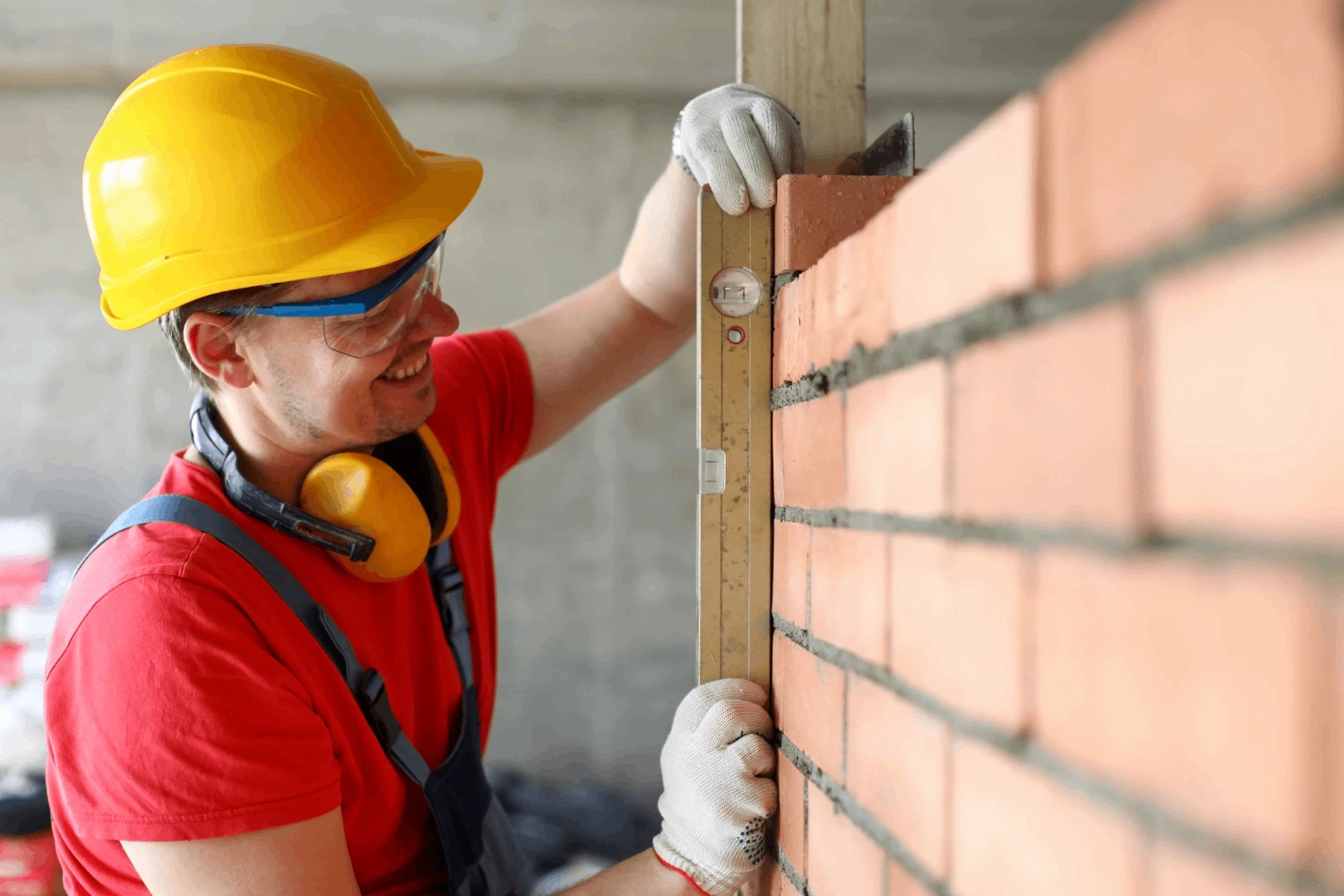After completing a bricklaying course in London, you can either enter employment within bricklaying or study further to advance your career in the construction sector.
If you enjoy using precision tools and building structures, being a bricklayer might be a good job for you. Bricklayers build walls and structures using bricks or blocks in the construction industry. You could work on various projects, from small extensions to large housing developments.
Bricklayers are important in the construction industry, a sector that has over £2 million jobs. It's a well-paying job, with salaries increasing as you gain experience. The average salary for entry-level bricklayers in the UK is £17,000, while experienced bricklayers earn an average of £40,000. There's high demand, so finding work is not too difficult. Each day brings new challenges, making the job interesting.
If you want to be a bricklayer, it's essential to know what's required. Furthermore, bricklaying courses in the UK can provide a boost to your career. This blog will guide you on qualifications, skills and career progression in bricklaying.
What is a bricklayer?

A bricklayer works within the construction industry. They focus on building structures using brickwork. They're basically craftsmen or masons who specialise in brickwork. They also conduct repairs or add extensions to buildings. It's a demanding job but feels rewarding when you finish a project. After a bricklaying course in the UK, you can start working as a bricklayer.
Bricklaying courses in London are an ideal choice for you to gain basic bricklaying skills. Starting in this field opens numerous options for related jobs like stone masonry, carpentry, site supervision and management roles.
What does a bricklayer do?
Bricklayers create homes, fix walls and chimneys and restore decorative stonework. They build, fix and take care of both interior and exterior walls, using bricks or other materials like concrete blocks, stone, or precast panels. While they often work on houses, they're also crucial in various other construction areas, working on structures like archways, partitions, chimney stacks and tunnel linings.
Responsibilities of a bricklayer may include:
- Measuring the work area
- Cutting bricks to the right size
- Mixing mortar
- Laying bricks in horizontal rows (called 'courses')
- Checking that all rows are level and fixed in place
- Creating access holes for other workers
- Ensuring that walls can resist water and weather
Pursue bricklaying courses in Manchester to become a skilled bricklayer.
|
Types of bricklayers |
|
|
There are different types of bricklayers: |
|
|
1. Refractory bricklayer |
Fixes or builds furnaces and tanks that resist heat and corrosion. Works in industries to replace damaged brickwork but also repairs domestic chimneys. |
|
2. Tuck pointer |
Focuses on enhancing the appearance of masonry. For example, if the mortar is worn out, removes it and replaces with new. |
How to become a bricklayer?
You don't need formal qualifications for bricklaying jobs, but if you're skilled, you might get better wages. Taking bricklaying courses in London can help boost your starting salary.
To become a bricklayer, it's usually helpful to have GCSEs in English and maths. Some employers may also prefer some experience in construction or other practical work.
As per the National Careers Service, the necessary qualifications for becoming a bricklayer include:
- Level 1 Certificate in Construction Skills
- Level 2 Diploma in Bricklaying
- Level 2 Diploma in Trowel Occupations
These bricklaying courses in the UK will teach you the necessary skills for the job and may help you secure a trainee position with a building company.
Additionally, many employers now look for a Construction Skills Certification Scheme (CSCS) when hiring bricklayers. This certification assures employers that the candidate is safe to work on-site.
To start a career as a bricklayer, these qualifications should be sufficient. However, once in the role, you can acquire further qualifications to enhance your employability. Advanced skills, such as laying out work areas, working with various types of bricks, mixing different mortars and constructing advanced masonry structures, can be learned at higher levels.
If you want to build a strong foundation for your bricklaying career, pursuing a bricklaying course in Manchester is a great option. You will not only learn basic knowledge but also advanced techniques.
|
What does it take to become a bricklayer? |
|
|
Physical fitness |
|
|
Love for the outdoors |
|
|
Teamwork skills and independence |
|
|
Skill and precision |
|
|
Health and safety awareness |
|
|
Ability to work long hours |
|
|
Patience |
|
Career progression in bricklaying after bricklaying courses in the UK
Entering bricklaying after completing a bricklaying course in London is just the start, leading to broader opportunities in the construction industry. Roles like construction manager, estimator and architect become achievable. Directly related to bricklaying, you can pursue site supervisory and managerial positions.
- Site supervisor
Site supervisors manage teams on construction sites. They follow site managers' instructions, ensuring worker safety, assigning tasks, meeting deadlines and conducting inspections. Experience on construction sites is valuable, as supervisors must understand daily operations and work to prevent risks.
You can pursue advanced construction courses in the UK to climb the ladder in your career.
- Site manager
Site managers often oversee entire sites and larger projects. Their duties include co-ordinating workers, communicating with clients and professionals, writing reports and negotiating contracts. These professionals are typically employed by housing developments and other construction companies.
Pursuing higher education can help you become a site manager. Construction courses like BSc (Hons) Construction Management with Foundation Year and HND in Construction Management for England (Construction Design and Build Technician) provide the required knowledge and skills to stay ahead in the competition.
Want to succeed in the construction sector?

If you want to enter and have a successful career in the construction sector, construction courses offered by Global Banking School (GBS) can help you achieve your goal.
GBS is a leading institution in the UK known for its industry-specific courses in areas such as construction, finance, business and more. With a significant presence in major cities of the UK, the institution is dedicated to its mission of “changing lives through education”.
Construction courses by GBS
1. BSc (Hons) Construction Management with Foundation Year
This course is tailored to address the demands of the current construction industry. It equips you with the specialised skills and knowledge essential for overseeing a construction project from its beginning and design phases to its completion and occupation.
After completing the course, you'll have the capability to ensure the safe, timely and budget-friendly delivery of construction projects while maintaining the highest quality and adhering to construction standards. You will apply fundamental theories, concepts and principles in construction management, covering aspects such as measurement, building appraisal, performance, design and buildability. Additionally, you'll have a solid foundation in general business management theory.
2. HND in Construction Management for England (Construction Design and Build Technician)
This construction course allows you to acquire current specialised knowledge from our experts while honing your organisational and planning skills. The learning experience is hands-on and practical, involving site visits, case studies and live projects.
Upon completing the course, various career opportunities will be available to you, including:
- Design and build co-ordinator
- Construction site supervisor
- Assistant design co-ordinator
- Construction design technician
- Project manager
- Health and safety manager
- Site manager
- Planning supervisor
You'll develop an understanding of how technology is changing the construction landscape, making you prepared and capable of working with this evolving technology. Moreover, you will gain insights into contemporary challenges in the industry, with a focus on sustainability and the environment and understand the role construction plays in addressing these issues.
Frequently asked questions about bricklaying courses in London
1. What can I do after a bricklaying course in London?
2. Can I get a bricklaying job without completing a bricklaying course in Manchester?
Yes, completing a bricklaying course in Manchester is not essential for bricklaying work. But having a qualification can help you get a higher salary. Bricklaying courses in Manchester can help you gain the skills employers seek.
3. What are the benefits of studying a bricklaying course in the UK?
A bricklaying course in the UK helps you:
- learn brickwork as well as other construction skills.
- form a connection with employers.
- get more internships and job opportunities in the industry.
Pursuing bricklaying courses in the UK can open numerous opportunities for you in the construction industry.
After completing a bricklaying course in Manchester, career progression in bricklaying may involve opportunities such as advancing to roles such as site supervisor or manager, with potential growth into broader construction-related positions like construction manager or estimator.
5. What do I learn in a bricklaying course in the UK?
In a bricklaying course in the UK, you'll learn essential skills such as bricklaying techniques, mortar mixing, construction safety and the ability to read and interpret construction plans. The course typically covers both theoretical knowledge and hands-on practical experience in bricklaying.

 Make a call
Make a call
 Prospectus
Prospectus
 Email
Email
 Whatsapp
Whatsapp
